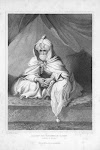Residents of Bauchi, Bauchi State, are familiar with the existence of gates across the city such as Kofar Wunti, Kofar Jahun and even Kofar Gombe (Wambai). However, only a few residents know that these gates used to be small doors through which only persons approved by the emir were permitted to enter the city in those days.
There were nine of such doors built by the Bauchi Emirate in those times. Daily Sun unraveled the history behind these doors called Kofar in Hausa built by the founder of Bauchi, Mallam Yakubu in the 17th Century after the Jihad of Shiek Othman Dan Fodio of Sokoto. The nine doors are Kofar lnkil, Kofar Dumi, Kofar Wase, Kofar Jahun, Kofar Nassarawo, Kofar Wunti, Kofar Ran, Kofar Tirwun and Kofar Wambai.
 |
| Picture 1: Wunti Gate in 1920 and Pic 2: Wunti in 1999 |
Wakilin Tahiri (Chief Historian) of the emirate, Alhaji Ado Dan Rimi, said Bauchi was established as a result of the Sokoto Jihad of 1804 by Mallam Yakubu, the first emir: “Mallam Yakubu was a flag bearer of Sheik Usman Dan Fodio. He covered most of the southern part of the caliphate during the Jihad and had wide land coverage unlike most emirs who concentrated in their emirates.”
He explained that in 1807, Yakubu, after capturing most of the areas was invited to Sokoto to meet with Dan Fodio to seek advice on the location he would start his town: “Bauchi was regarded as a land of unity in diversity because of its combination of so many ethnic groups all living in the same place. The name Bauchi was coined owing to the inability of the different ethnic groups to understand the other person’s language.
“On Yakubu’s arrival in Sokoto, Dan Fodio asked him where he was interested in starting his town. Yakubu suggested Wase, Babah, or Zaranda. The Sultan told him that if he settled in any of these areas, his people would be rich without faith and Islam would not be cherished.”
Mallam Yakubu then suggested Inkil, again, the Sultan told him that if he established his kingdom in Inkil his followers would become singers instead of promoters of Islam. At that point, Yakubu sought the advice of Dan Fodio: “Dan Fodio advised Yakubu to consider a part of the Warinje Hill area into his town but warned that the place was full of snakes. The Sultan said he would pray to God for protection for Yakubu and his people.
“He assured Yakubu that if he built his town around the Warinje Hill, nobody would be able to defeat him in war in and Islam would flourish forever. He and his subjects would not be rich but would not poor either but Islam would grow and be sustained and they would live happily.
“The surface of the earth in the Warinje Hill was hard but when the people sowed grain, the harvest was bountiful as those that sowed in sandy and fertile area. That is why till date there is a proverb in Hausa that says, ‘Bauchi Naman Kai ga kise ga tare,’ meaning ‘the flesh in the head is close to the bone but full of flesh and fat.’ That is even though the people hate sowing on hard surface, yet the yield is good.”
On his return, Yakubu first went to Inkil, located a hill there in a virgin land with some rocks and started building his town where he first built a mosque, then a prison yard and the kingmakers house before building the town in present day Bauchi.
“Between 1807 and 1812, Yakubu built the wall of the city of Bauchi first with four gates namely Kofar Inkil (or Iddi), Kofar Tirwun, Kofar Wase and Kofar Wunti, which were later increased to nine due to expansion. Few years after Bauchi was founded, it developed into a cosmopolitan city with different ethnic groups such as Jarawa, Nupe, Hausa, Gerawa and Arabs.
“To meet the demand for space, Yakubu expanded Bauchi by building five more gates namely, Kofar Jahun, Kofar Ran, Kofar Nassarawo, Kofar and Kofar Dumi. The emir built a wall surrounding the city and movement in and out of Bauchi was through any of the nine doors. Movement was thus restricted. The gates were usually closed by metal doors.” Daily Sun was shown two of the doors:
“Some of the metal doors can now be seen in the National Museums in Lagos and Jos. Two rooms were attached to each of the nine gates – one for Ajiya tax or revenue collector, and the other for guests who arrived late and usually slept there for protection.
“The door (gate) was always closed with two male keepers manning them. Anytime a visitor, guest or strangers wanted to enter the city, the keepers asked him his mission and then informed his superior who in turned informed the emir.”
Culled from Sun Newspaper written by Paul Orude









0 Comments